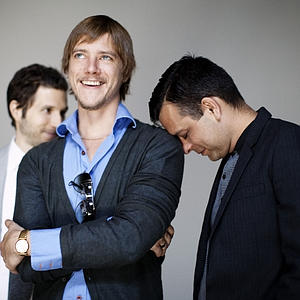 After three years of upheaval, Interpol is still going strong.
After three years of upheaval, Interpol is still going strong.
Interpol released its long awaited, self-titled, fourth album in September and is about to embark on a world tour despite the departure of long-time member Carlos Dengler. Interpol’s 2002 debut, Turn the Bright Lights On, emerged from the post-punk revival on the indie Matador label. The combination of ominous bass, rhythmic guitar, and brooding lyrics in ‘Turn the Lights On’ turned Interpol into indie rock stars. The second album, 2004’s Antics, was both a critical and commercial success. With Antics, Interpol rose to national fame, and in 2006 they left Matador for major label Capitol Records. The move to Capitol signaled a turning point for the worse, though. The third release, 2007’s Our Love to Admire, was widely panned by critics and fans alike. Lead singer Paul Banks then released a solo album. Fans wondered if Interpol’s time was up, but Interpol returned to Matador Records last year to begin work on the self-titled fourth album.
“I think we were very aware that here is an opportunity and the slate is whipped clean, it’s blank,” guitarist Daniel Kessler says. “We have the opportunity to say something new and go forward.” After finishing the album, bassist Carlos Dengler left Interpol. “He was in the band from the beginning so it’s a big change to go out without him. That being said, it wasn’t just one day he walked inside and announced he was leaving. He was a bit conflicted while we were writing the record because he was really very involved with the writing of this record. But at the same time, there were a lot of other things he wanted to tend to in his life outside being in a rock band and outside music all together.I think when he completed recording his parts for the album we put all our focus in mixing the record and making sure it sounded exactly like we wanted to, then we looked towards the next logical step, which was finding people to play with.” David Pajo of Slint replaced Dengler on bass and Brandon Curtis of the Secret Machines has been added on keyboards.
The dramatic line-up change shouldn’t affect Interpol’s sound.” I think David’s been very faithful to the parts and very respectful to Carlos’s parts. He’s a great musician and studied the way Carlos played them.” Although the new additions have joined Interpol on tour, Kessler shies away from calling them permanent. “It’s hard to tell. In the history of Interpol, we’ve never looked too far ahead, instead focusing directly on the road ahead of us. But we’re open to all possibilities.”
After numerous world tours, Kessler still seems excited at the prospect. “It does and it doesn’t change,” he says. “I think it comes full circle. When we see these people paying that much attention to your music and singing your words, its an incredible human connection to have with an individual. And to me, that’s not lost all. I suppose that’s been there since day one, but you can always get a reminder”.
Another aspect that keeps tours interesting is a flexible set. “We’re an album band,” Kessler says. “It’s not like we’ve had one or a couple of runaway singles. I think if you ask 10 different people in the audience what their favorite songs are, you’ll get 10 different answers. I guess the best songs to play are the songs that you haven’t played in a while. It keeps you on your toes and is kind of exciting.”
Interpol performs Sunday, October 31 at 4:15 p.m. on the Voodoo Stage.




